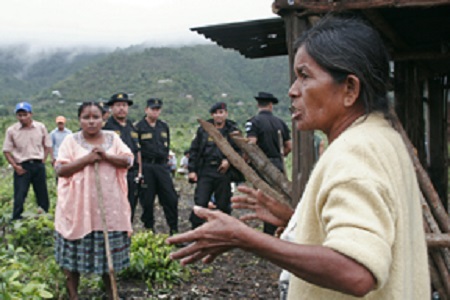Violent attempt to evict Maya Q’eqchi villagers despite COVID-19 crisis in Guatemala
On 13 April 2020, private security forces suspected of working for Industria Chiquibul, S.A., an agribusiness engaged in the harvesting and extraction of palm oil, attempted to evict 200 indigenous peasant families from their homes in Tierra Blanca, municipality of Sayaxché in the Department of Petén. Men, women, children and the elderly were among the victims of this violent and unlawful eviction attempt.
At 7:30 in the morning, 45 members of a private security commando descended on the community without notice or a judicial order authorising the eviction. They fired shots in an effort to intimidate members of the community and eject them from their homes. Although on this occasion the community managed to defend itself and ward off the private security forces, Izáis Tiul Pop, a 30-year-old community member was gravely injured during the course of the failed eviction attempt.
Eight National Civil Policemen (Policía Nacional Civil (PNC)) witnessed what transpired and did nothing to stop it. They had entered the Tierra Blanca settlement to ensure residents were complying with the COVID-19 public health measures imposed by the Government of Guatemala.
“The National Civil Police’s failure to protect the community is all the more concerning in light of the COVID-19 pandemic,” notes Lara Domínguez, Strategic Litigation Officer at Minority Rights Group International. “Indigenous peoples are among the poorest and most marginalised communities in the world, making them more susceptible to the deadly effects of the virus. Had this eviction succeeded, 200 vulnerable indigenous families would have been left homeless, with no place to shelter from the virus.”
The attempted eviction is part of a larger land conflict between private palm oil companies and members of the Maya Q’eqchi community. For several years now, palm oil companies operating in the region have appropriated lands from vulnerable indigenous communities using shady, coercive and sometimes even unlawful means. Impoverished and bereft of lands on which to carry out traditional subsistence activities, many members of the Maya Q’eqchi community have been forced to work on the palm oil plantations these companies have established on their territories, often in deplorable and exploitative conditions.
“In light of these grave fundamental rights violations, the Government of Guatemala must order the competent authorities to conduct an exhaustive investigation into Industria Chiquibul, S.A.’s role in this unlawful eviction attempt and the PNC’s failure to protect the community, holding those found responsible to account” maintains Lara Domínguez. “The Government must also stop any further evictions of indigenous peoples from taking place during the course of the COVID-19 pandemic.”
Contact:
Lara Domínguez
Strategic Litigation Officer at MRG (English and Spanish)
Email: lara.dominguez@mrgmail.org
Tel: (+44) (0) 7780561390
Twitter: @MinorityRights
Photo: Standing strong, Mayan women scolds soldiers for the devastation they have wrought on behalf of mining interests on Maya Q’eqchi’ land in 2017. Photo by James A. Rodriguez/Indian Law Resource Center.














